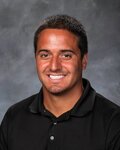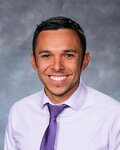

Dominique Coffin and Rudy Joya both have a different routine than pre-COVID. One of the most important aspects of their jobs now is making phone calls and home visits to students and families that are struggling with remote education.
“I had a focus on athletics, and now with sports only doing our ‘open period’ [noncompetitive conditioning], it’s changed a lot,” said Coffin, who is the CHS athletic director and also became the IRMS dean of students this year.
“You could say my job is way different with no students here,” said Joya, CHS assistant principal. “The major change is the method of communication. I am still doing attendance and discipline work, just communicating differently about it with students and families.”
Joya and Coffin have stepped up, like all of the district staff, to meet the pressing demands of an evolving situation. Teachers are the front line in terms of gauging the wellbeing of students. If there’s a concern for a student, they reach out to Joya and Coffin for help. “Rudy and I created a form for teachers to fill out,” explained Coffin. “Teachers answer five short questions. Then that information is put into a spreadsheet, and we are notified.”
Joya mentioned the school counselors and grade reports are other mechanisms for identifying students. “Within all these layers, we’re able to choose students with multiple concerns and we visit those students, or we refer to counselors if that is a better option. We also get phone calls from parents asking for help because their student is not listening to them. We visit those students also.”
On Fridays, both administrators take district vehicles and make the rounds to about five students’ homes, spread out over the full extent of the district. Phone calls happen on the other days. “I joke with Elia [the CHS principal] that I am going to find a new job in telephone calling because that is my expertise now,” said Joya. “With parents not being able to answer the phone during work, I am often making phone calls after 4:30pm from home or on my way home.”
What happens when they show up on a student’s doorstep?
“Each home visit is different,” said Coffin. “For some students, it might be behavior issues, for others, they are not attending class or not doing the work, and for some, it’s all the above.”
The administrator will talk to the student, who might be alone, and/or to a parent or grandparent. “With some parents, it is a relief that we came. Because they have tried so hard to get their student to do something but have had no success,” said Joya. “They see us as another level of intervention for their student.
“We also show students that this is serious. Some of their faces when we show up are priceless. Sometimes we leave home visits feeling like we accomplished nothing, but later find out that the student started contacting teachers and doing work when they had not for a long time.”
Comments
No comments on this item Please log in to comment by clicking here